In season, in season, garden eggs are in season.
Truth be told they’ve been in season for a month or so now. Wheel-barrowed boys and men push these out-of-hand eggs around the city. Parking at office gates, awaiting the gong of closing time for sales to peak. Or outside school gates, though I doubt this is true, for aren’t adults more accustomed to the tastes of ‘bitter’ than children?

Though seasonal, you can find them all year round. The non-season sees the disappearance of the wheelbarrows. Replaced by young men and women, expertly balancing trays of garden eggs and conical bags of peanuts.
What fascinates me with garden eggs is their texture and their slightly bitter flavour. For I have long been intrigued by how bitter flavours play an essential role in African cuisine.
Months ago, my mother said of adding bitterleaf to a pot of Banga soup I was cooking: “Every Nigerian soup benefits from a bit of bitterness”. It makes perfect sense that bitterness, by its very virtue creates sweetness. Enhances it. Bittersweet.
For garden eggs are somewhat bitter, in addition to being spongy and chewy and filling and apparently hard to describe in tastes. In the raw sense.
Cooked, and how they are cooked, one might have more useful descriptors and descriptions to share. Roasted, they may take on a smoky flavour; stewed and pureed, they may turn to cream. I’m going to do some testing but I begin at raw. Currently in 1st place.
Of all these, I have the strongest memories of eating them out-of-hand. Thats the taste I know, remember, can speak off. It is the season for them, and in the markets one can buy various quantities, sold in containers. Like custard buckets.
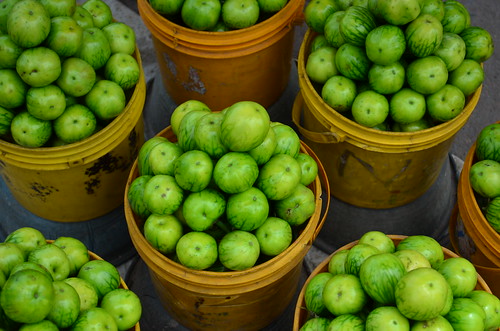
Move on to Thailand where they also feature prominently, but are commonly cooked – from sautéed to stewed. Another connection between our cuisines. Like Pawpaw, Papaya.
Late in the 1500s British traders introduced London’s greengrocers to a strange new vegetable they’d picked up along the coast of West Africa. By 1587 this so-called “Guinea squash” was on English dinner tables. Although eaten as a vegetable, it was actually a small fruit about the size of a hen’s egg. It was the same color as a hen’s egg also. This pure white ellipsoid made an eye-catching eatable, which for obvious reasons the public soon dubbed “egg-plant.” ‘Lost Crops of Africa, Volume II: Vegetables’

Its interesting (to me) to see how cuisines around the same latitude grow the same produce.
Thai eggplant is an Asian vegetable with a slightly bitter taste that grows in both short, round shapes and long, narrow types. Unlike other eggplant varieties, Thai eggplant is usually white, green or pale yellow instead of dark purple. Due to its hearty texture and distinctive taste, Thai eggplant doesn’t require a long or complicated cooking method. It can be heated through slightly on the stove top just enough to soften it and enhance its taste. Thai cuisine typically uses both sweet and spicy ingredients, so flavor the eggplant with fish sauce, chili pepper and sugar for an authentic taste; Source ehow
These ‘eggplants’ are edible raw, and do not require cooking, unlike the regular purple aubergines.
Though they are slightly bitter, they do not have to be salted to make them palatable and tender.
Though the garden eggs are available year-round, you begin to see them in copious amounts from the end of August through to October and…… (I’ll watch out for when I stop seeing them sold in wheeled carts).
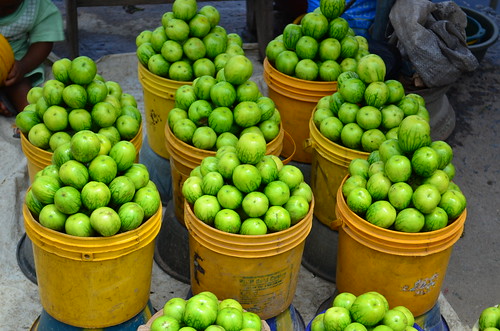
Garden Egg Facts
Nigerian name: Anara (Igbo/East); Ìgbá (Yoruba/ West)
Genus/Latin name: Solanum Melongena
English name: Garden eggs, mock tomato, scarlet eggplant, Ethiopian eggplant, African bitter pea-aubergine, wild pea-aubergine, wild African aubergine, tomato-fruited eggplant, Ethiopian nightshade,
Other names: African Garden Eggs; Guinea Squash, African egplants, Anthora (exported from Caribbean to Europe)
Season: the first fruits start to appear at the end of the Nigerian ‘dry’ season (February, March)
Provenance: All over Africa, Brazil, Caribbean and SE Asia
Uses/products: Eaten out of hand as a snack, cooked
Shape & Size: Small, ellipsoid fruit, the size of a hen’s egg or golf balls
Appearance: According the book ‘Lost Crops of Africa, Volume II: Vegetables’, the garden eggs exist in a myriad of colours from white, cream, yellow, green, lime, orange, pink, red, plum, burgundy, lavender, violet, purple,to dusky black. I have only ever seen the white and green varieties. The skin of the fruits are somewhat glossy and could be smooth or ribbed.
Taste profile: Bittersweet
At a glance, those in the know can distinguish the sweet cultivars, whose fruits possess smoother skin and a more evenly rounded profile.‘Lost Crops of Africa, Volume II: Vegetables’
Storage: refrigerator for a week to two; though proper storage measures can keep them fresh for 3 months.
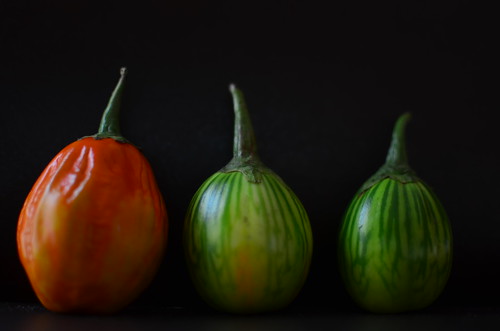
To eat:
In Nigeria, they are consumed
- Out of hand…in copious quantities. On their own or with peanut butter, spiced with grains of paradise, okwu-oji
- Combined to make salads, with other vegetables like cassava (Abacha)
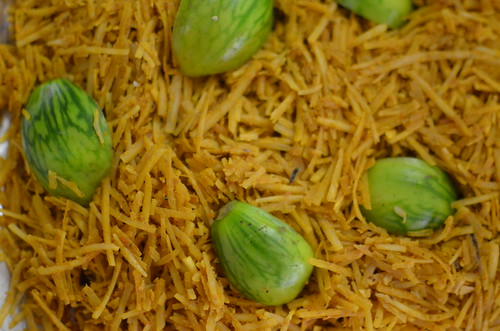
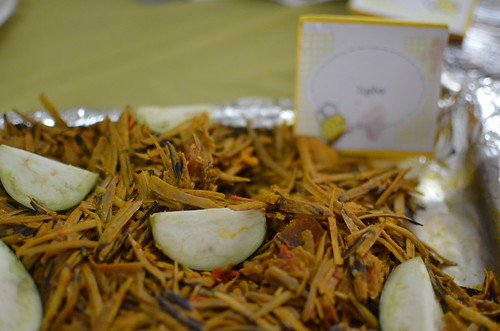
Typically in Africa, the garden egg is chopped, cooked and mixed into a variety of vegetable, meat, or fish stews and sauces. Although bitter taste is a major characteristic, many African eggplants are sweet or bland, especially in the immature stages in which they are eaten. The unripe fruits are usually cooked in a sauce after being chopped, parboiled, ground, or otherwise prepared. Peeling is unnecessary because the skin becomes tender enough to be consumed along with the rest. They are among the few vegetables that reach full flavor only after being cooked beyond the crisp stage;
By the standards of the modern Western world, this veggie is a diet-doctor’s dream: low in sodium, low in calories, high in dietary fiber, and a good source of potassium. It is used as a meat substitute not because it is high in protein, but because its spongy texture easily absorbs the other food’s flavor while providing a mouth feel vaguely suggestive of the presence of meat. Lost Crops of Africa, Volume II:Vegetables
In Thailand, they are eaten in various ways, mostly cooked
“….round eggplant” but in Thailand, we just know it as “ma keua praw.”
- Raw, dipped in salt and chilli powder: Fresh and tender eggplants of this type are eaten raw by dipping in spicy dip sauces. You might also find a Thai eating this eggplant by dipping it in a dry mixture of salt and chilli powder. The Thais either cut the eggplant into small strips and eat it raw or take a bite from the raw vegetable piece by piece. There have been no other reports of the eggplant being eaten raw so we presume that this is done only in Thailand.
- In curries and stir-fries
- Pickled: plain and peppered, like kimchi
Everywhere else
So this season, while thunder pounds the skies, I’m taking it easy and discovering the myriad of ways and flavours to enjoy my garden eggs.
- I’m having them raw. With chopped apples and cucumbers. Flavours which don’t necessarily go together but I love the bitter, the crisp and the cooling all together. With Okwu-oji (peanut butter sauce)
- I’m having them the Nigerian way – sauced, but smoking the eggs first
- I’m having them pickled
- I’m making a Chutney (Indian spices) of them
- I’m having them stir-fried, with lots of herbs and spices in Herbed Basil Eggplant
- And finally, I’m having them curried. In a hurry. Served with white rice.
I’m having them|Nigerian-style, Indian-style, and Thai-style. I’m having them any which way.
Some great recipes with garden eggs
Garden Egg Sauce, with boiled plantains (Nigeria) Eggplant stew with meat, fish and shrimp (Ghana)Easy Thai Green Curry , @ She Simmers (Thai) Eggplant Stirfry @ Christine’s Recipes (Thai) Bagara Baingan @ Fatfree Vegan Kitchen (Indian) Northern Thai Eggplant Salad @ Thai Table.com
Have you tried them before? What do you think?
I’ll bring you my experiments in the coming days, from classic to contemporary, South East Asian and ….who knows?
Have a wonderful weekend.[wpurp-searchable-recipe]Nigeria’s Rainy Season Produce: September & Garden Eggs – – – [/wpurp-searchable-recipe]



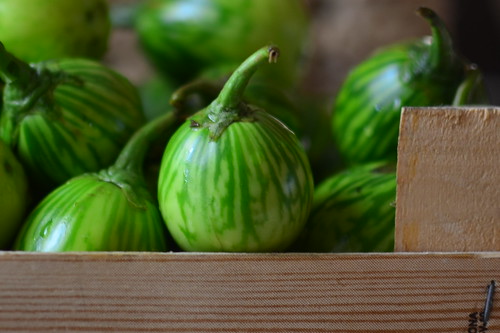

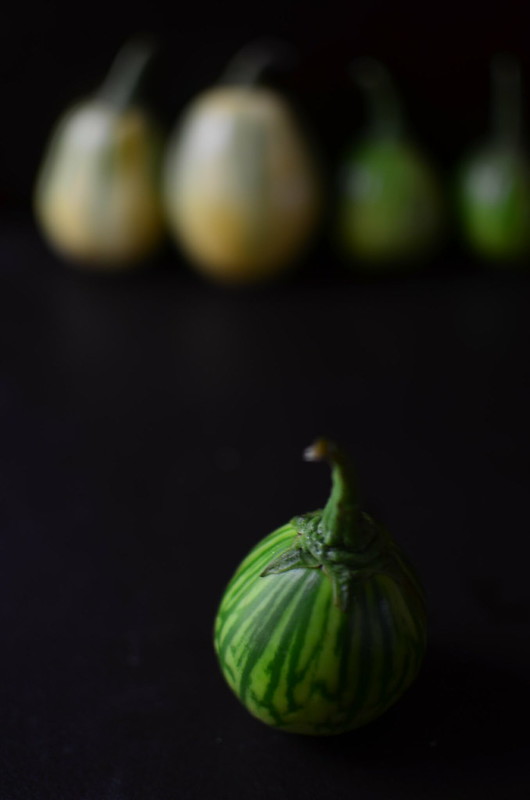



What is the english name for ishiekwu
Velvet Tamarind is the English name for Icheku
[…] I’ll bring you the tomato stories then, and tales of September and October […]
How fascinating! I have had these in Thai curries before, never did I realise that there were so many ways of eating them. Love all your photos Ozoz, and how much I’m learning through you. Keep sharing 🙂
Thanks a lot shaz!
These are new to me. Great photos and a terrifically informative post. Thanks so much.
Glad I could share some of the stuff from this end of the world.
I’ve never heard of these before and your photography is beautiful. I’ve been hearing more and more lately about nigerian food and i’m dying to try it!
Thanks M. I’m thrilled to see Nigerian food coming into focus, and excited to be part of it!
I love it! once again, I’ve never heard of this vegetable! I had to do a driving test last year and I had many Nigerians as my classmates – some would bring their lunch with, of course I had to grab a bite! Dishes that sounded very familiar, like rice and chicken… tasted completely new and unrecognizable, because of the different spices and ways to prepare… Not sure what point I’m trying to make, but I think I would love Nigerian food!
Alla – I get the point. Its of connectedness. And understanding, and perhaps knowing more about the culture from which your class mates, whom you had only a short time to get to know…. I get it. I get you.
Promise to cook you something someday!